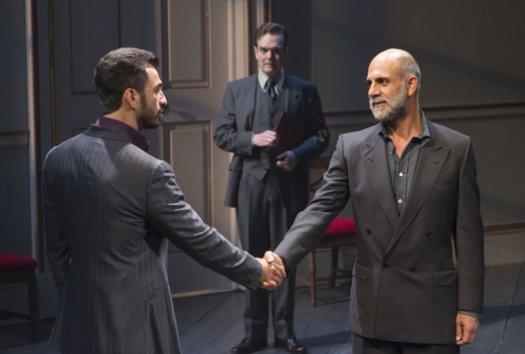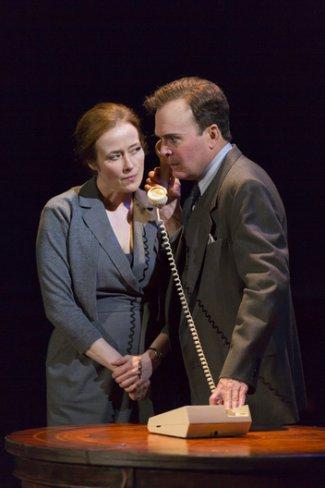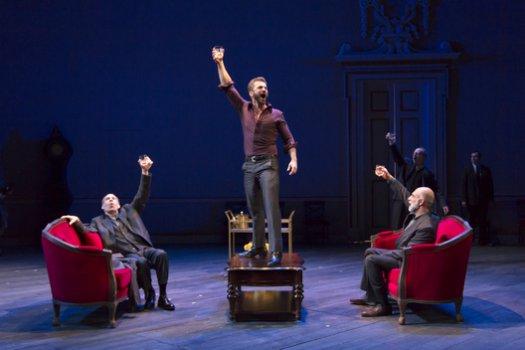Oslo
A riveting piece of theater on every level, even as it replicates, for us, a hidden and complex chapter in near-recent history.

Michael Aronov, Jefferson Mays and Anthony Azizi in a scene from “Oslo” (Photo credit: T. Charles Erickson)
[avatar user=”David Kaufman” size=”96″ align=”left”] David Kaufman, Critic[/avatar]Though it may be difficult understanding all of the many characters’ foreign names in Oslo–let alone keeping track of them–and though the play which contains them is equally complex, it also proves remarkably clear and relatively easy to follow. Such an opening for a review may be an instant turn-off to many a reader, who would prefer to see something they can easily enjoy, without having to work at comprehension. But the rewards of Oslo come in unexpected ways and places–not unlike they were with Michael Frayn’s 1998 Copenhagen, another play based on real history in the same part of the world.
The clarity of this new play by J.T. Rogers does not only rely on the smart yet surefire way it’s written, but also on the masterful staging by Bartlett Sher, who, after recent productions of both South Pacific and The King and I, is no stranger to directing gargantuan shows at Lincoln Center. Given its subject–the Oslo Accord or peace treaty between Israel and the Palestine Liberation Organization (P.L.O.) in 1993–Oslo is ultimately, an enormous play, but it is told in intimate terms.
Based entirely on actual people and real circumstances, the two principle figures are Mona Juul and Terje Rod-Larsen, a Norwegian couple who come across as so very opposite in many ways, even though they have a shared motive for wanting to do what has seemed increasingly impossible for at least nearly 70 years: to bring peace to the Middle East. But even as they bring together Israelis and Palestinians for secret talks in their hometown of Oslo, beginning in 1992, Mona is all poise and a calming influence; Terje is overly fastidious and ready to fly-off-the Scandinavian handle at any moment.
It’s relatively early on that two phones on the same table simultaneously ring, and Mona (an official in the Foreign Ministry), and Terje (Director of the Fato Institute) literally cross wires to take the calls and represent one side’s immediate wishes to the other. While having to maintain utter secrecy about the talks to the rest of the world, the fact that certain Israeli professors are involved, at first, is what makes the talks possible: they’re ostensibly meeting for academic and economic reasons, as opposed to pursuing peace. It is one of the professors who refers to “American sponsored talks” currently happening in London, adding that, “God knows [they] are going nowhere.” One of the two principal Palestinians involved, Qurie (or “Abu Ala”), describes the London talks as, “The dialogue of the deaf. Talk at, never to.”

Jennifer Ehle and Jefferson Mays in a scene from “Oslo” (Photo credit: T. Charles Erickson)
Terje and Mona back up in chronology to explain that they were prompted to pursue what countless others have tried to do before, following a visit to both Jerusalem and to the Gaza strip–where, Mona tells us, “a million Palestinians” are “crammed into an area twenty-five miles long and only a few miles wide.” (“Without regular electricity or water,” she adds.) They also recreate their own initial conversation, which led to the talks. It’s revealing that the more pragmatic Mona says to Terje, “The plan you are proposing is not possible,” to which the more idealistic Terje corrects her, saying, “No it is not probable,” with an emphasis on that last word. Terje then rhetorically asks, “If there is even a two percent chance, how can we not take it?”
On another hand, and in another scene, Mona also says, “My husband shows no deference to power,” which may have been a necessary attitude or ingredient for facilitating the talks. It is also telling that we never really see any of the actual talks that proceed to occur between the various representatives of both Israel and Palestine. We do, however, see what leads up to many of the closed-door meetings, as well as the players’ interactions afterwards. And it is once again a tribute to Sher’s direction, as well as to a uniformly brilliant cast, that each of the many figures is realized and delineated with such emotional precision.
Jennifer Ehle especially excels as Mona, as does Jefferson Mays as Terje. However, if their performances stand out, that may be simply because they are the leads. They are also our guides and allies throughout the story, setting up scenes and helping us to understand the impact of what we’re about to see–or what we’ve seen, for that matter.
It would be wrong not to also single out Anthony Azizi as an always impassioned and fierce Qurie, and Daniel Oreskes as both Hirschfeld, one of the Israeli economics professors, and Shimon Peres. But kudos also go to the rest of the large ensemble: T. Ryder Smith, Daniel Jenkins, Henny Russell, Christopher McHale, Jeb Kreager, Dariush Kashani, Adam Dannheisser, Michael Aronov, Joseph Siravo, and Angela Pierce.

Daniel Oreskes, Michael Aronov, Anthony Azizi, Daniel Jenkins and Jeb Kreager in a scene from “Oslo” (Photo credit: T. Charles Erickson)
Though Michael Yeargan’s towering but spare set designs do what they can to place the action–with tables and chairs being shuttled on and off the stage space–they can do little to compensate for the enormous area they have to fill. Yeargan’s visual effects are also occasionally enhanced by projection design by 59 Productions. Catherine Zuber has nonetheless provided appropriate costumes, and Donald Holder’s lighting is always on target.
If you happened to see Oslo during its premiere production last summer, you might feel that it actually worked better in the much smaller Mitzi E. Newhouse Theater. The intensity of the drama became more so when it unfolded in a more intimate environment. Now, at the cavernous Vivian Beaumont Theater, the players are dwarfed by the space, running from one end of the arena-type area to the other and shouting their lines, lest they not be heard.
But it remains a riveting piece of theater on every level, even as it replicates, for us, a hidden and complex chapter in near-recent history. It’s also a story that’s custom-made for drama: as the real Mona Juul claims about the Oslo talks in a helpful program note, “This kind of diplomacy is also a lot about acting. In the art of diplomacy, you have to play a role.”
Oslo (extended through July 16, 2017)
Lincoln Center Theater
Vivian Beaumont Theater, Lincoln Center, 150 W. 65thStreet, in Manhattan
For tickets, call 800-840-9227 or visit http://www.lct.org
Running time: three hours with one intermission






Leave a comment